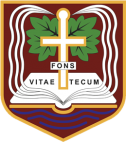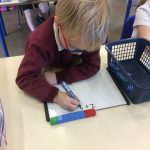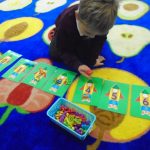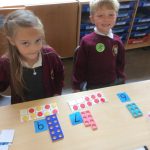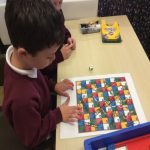Mathematics is a tool for everyday life, which teaches us how to make sense of the world around us, by developing the ability to calculate reason and solve problems. It enables us to understand and appreciate relationships and patterns in everyday life, and to analyse and communicate information and ideas.
Intent
At WSM we provide every child with a sound understanding of number for life. This is taught systematically with knowledge building each year upon previous knowledge. Our children develop skills to apply their mathematical knowledge to different contexts and everyday life. All children leaving Welwyn St Mary’s will have an appreciation of the power of maths, a sense of enjoyment and curiosity about the subject. They will feel confident in their use of maths ready for the next stage in their mathematical journey.
Implementation
Our maths is taught in year groups using the Hertfordshire ‘Essential maths’ plans. These enable a child to acquire new knowledge sequentially and deepen their understanding through mastery of new concepts. Through the teaching of the ‘Essential maths’ curriculum pupils will make rich connections across mathematical ideas to become fluent in the fundamentals of mathematics, reason mathematically and become competent in solving increasingly sophisticated problems.
Teachers use a mastery approach to teaching. Children are taught altogether as a class with lessons carefully planned in small steps.
Daily teaching combines a concrete – pictorial – abstract approach enabling children to explore mathematical concepts. By revisiting these concepts year on year children can build upon and deepen their knowledge and understanding. The use of manipulatives in maths lessons ensures that concrete understanding underpins concept building and leads to fluency and mastery.
Formative assessment of attainment and progress is part of daily classroom practice informing next steps and identifying where additional provision is needed. A clear progression of knowledge and skills forms part of the planning. Immediate intervention is used throughout the school to close gaps or deal with misconceptions.
Where a cohort shows a particular weakness, it may be necessary to introduce setting so as to personalise learning and target specific mathematical concepts.
Mathematical teaching and learning at Welwyn St Mary’s is outlined in detail below.
Years 1 and 2
The key focus of mathematics teaching in Key stage 1 is to ensure that pupils develop confidence and mental fluency with whole numbers, counting and place value.
By the end of year 2 pupils should know the number bonds to 20 and be precise in using and understanding place value.
Pupils should develop their ability to recognise, draw, describe, compare and sort different shapes. They should also use a range of measures to describe and compare length, mass, capacity/volume, time and money.
- Year 1 maths
- Year 1 maths
Years 3 and 4
The key focus is to ensure that pupils become increasingly fluent with whole numbers and the four operations, including number facts and place value. Pupils will develop efficient written and mental methods and perform calculations accurately with increasingly large whole numbers.
Pupils will develop their ability to solve a range of problems including with simple fractions and decimal place value. They should draw with increasing accuracy and develop mathematical reasoning so that they can analyse shapes and their properties. They should use measuring instruments with accuracy and make connections between measure and number.
By the end of year 4 pupils should have memorised all of the multiplication tables up to and including the 12 multiplication table.
Years 5 and 6
The key focus is for pupils to extend their understanding of the number system and place value, to include larger integers. They will develop the connections between multiplication and division with fractions, decimals, percentages and ratio.
Pupils will be expected to solve a wider range of problems which will demand efficient written and mental methods of calculation. With this foundation in arithmetic pupils will be introduced to the language of algebra as a means for solving a variety of problems.
Geometry and measure will consolidate and extend previous knowledge developed in number. Pupils will classify shapes with increasingly complex geometric properties and learn the vocabulary they need to describe them.
By the end of year 6 pupils should be fluent in written methods for all four operations, including long multiplication and division and in working with fractions, decimals and percentages.
Weekly mental maths homework is set from year 2 for all children.
Please contact your class teacher to see our progression documents. Knowledge Organisers can be found on Google Classroom. These will be posted as we teach each unit of work.
The document below shows how your child will learn in different ways as they move through our school.
- EYFS Maths curriculum map (105.45KB)
- Maths Curriculum Map - whole school (124.31KB)
- Maths - progression of skills (206.67KB)
